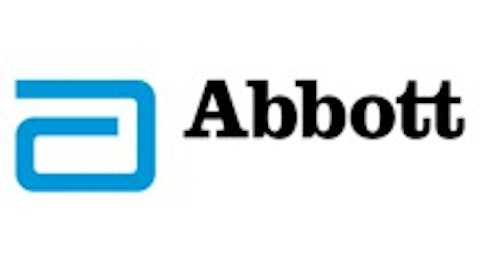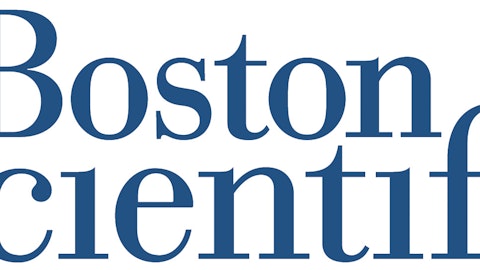Boston Scientific Corporation (NYSE:BSX) has rallied nicely year to date, up over 35%, but is there still room to grow for this heart-related devices company? Cardiovascular disease remains the number one killer worldwide. The number of adults diagnosed with heart disease in the U.S. is around 11.8 percent of the total population.
Earlier this year Boston Scientific Corporation (NYSE:BSX) revised growth plans to better account for the challenging economic environment. Boston has announced plans to focus on strategic initiatives like restructuring and movement toward emerging markets, both big positives.
These moves are expected to help the company grow faster than the overall market for implantable heart devices, despite losing market share for implantable heart defibrillators, pacemakers, and heart stents over the last few years.
The company expects a stabilization of its Cardiac Rhythm Management (CRM) market, which will lead sales improvements (low single digit growth) over the next three years. For the next five years, the company expects growth rates to increase to mid-single digits.
Various acquisitions should also allow Boston Scientific Corporation (NYSE:BSX) to break into other fast growing markets, including its Vessix Vascular acquisition, which now gives the company exposure to the fast growing renal denervation franchise — a therapy for the treatment of uncontrolled hypertension. One billion people globally suffer from hypertension, and the segment is expected to be a multi-billion dollar market by 2020. Another key purchase was BridgePoint Medical, a developer of catheter-based systems to treat coronary chronic total occlusions.
The Future Lies Abroad
In the face of declining sales growth in developed markets, such as the U.S. and Europe, Boston Scientific Corporation (NYSE:BSX) is looking to up its presence in the emerging markets of Brazil, Russia, India and China (BRIC). These nations combined recorded over 35% sales growth year over year last quarter.
The emerging markets, especially the BRIC nations, are expected to show growth that includes a 2.5-fold increase in sales by 2017, going from 4% of total sales in 2012 to 10% in 2017. The company also recently created a new Asia-Pacific regional organization to increase capabilities in the region. Boston Scientific Corporation (NYSE:BSX) has big plans for China specifically, planning to invest around $150 million over the next 5 years to build a local manufacturing operation.
A total of 40 hedge funds were bullish on Boston at the end of 2012, including one of the top hedge fund owners by market value, billionaire Leon Cooperman’s Omega Advisors, which had 2.8% of its 13F portfolio allocated to the stock (check out which other hedge funds love Boston).
Competition Is Fierce
Boston competes with the likes of Medtronic, Inc. (NYSE:MDT) and St. Jude Medical, Inc. (NYSE:STJ) for its heart rhythm devices, and with Medtronic and Abbott Laboratories (NYSE:ABT) for heart stents. Medtronic, Inc. (NYSE:MDT) engages in medical technology, operating two segments, cardiac and vascular, and restorative therapies.
The real downside to Medtronic, Inc. (NYSE:MDT) is that it has the lowest expected 5-year EPS growth rate of all five stocks listed, with analysts expecting the company to grow ESP at an annualized 6%.
Medtronic is also turning abroad for growth. The company is looking to China for future growth, and recently acquired a Chinese orthopedics device maker and an equity interest in a Chinese developer of cardiovascular devices,
Unlike Boston’s 40 hedge fund owners at the end of 2012, Medtronic had only 34. This does, however, include some top names like Diamond Hill Capital, Relational Investors and Legg Mason Capital (see which other hedge funds are active in Medtronic).




